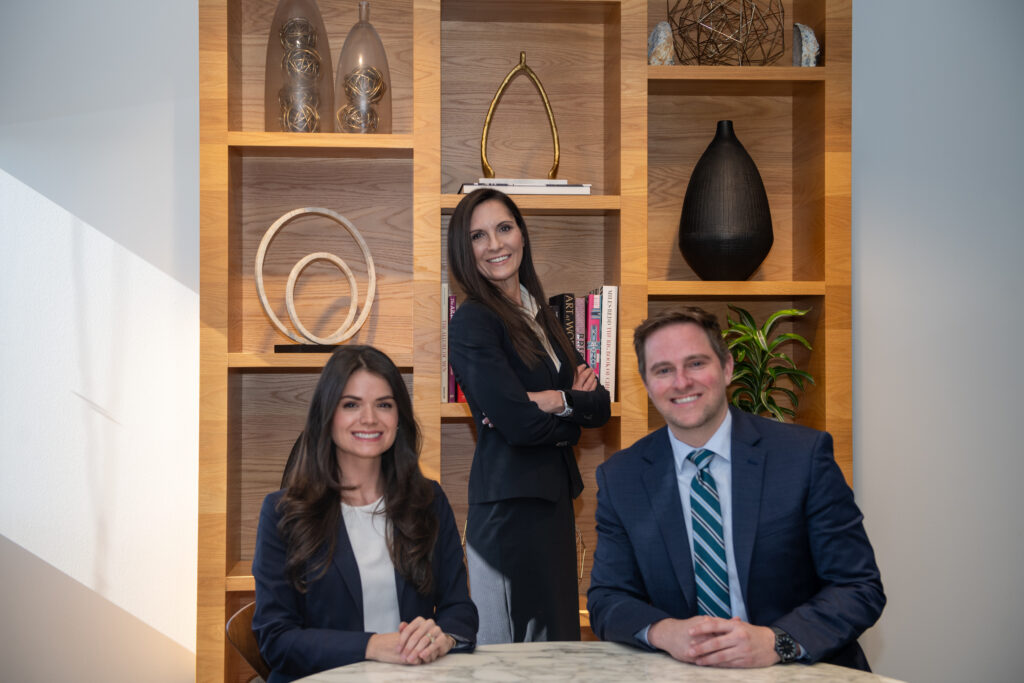
When Google changed its policy in 2020 to require all businesses selling apps through the Google Play Store to use Google’s electronic bill pay system, officials at Match Group quickly realized that this meant hundreds of millions of dollars in lost revenue.
The alternative was even more devastating — being booted off Google Play, which generated billions in revenues from Android users for Match brands, such as Tinder, PlentyofFish and Match.com.
The Match legal team — including Chief Legal Officer Jared Sine, Associate General Counsel Jeanette Teckman, Senior Litigation Counsel Stephen Myers and Litigation Counsel Katie Johnson — tried to work with Google for two years, but finally decided in March 2022 to sue its largest business partner on allegations of market manipulation, broken promises and abuse of power.
“The Match legal team faced many enormous obstacles and challenges to get the desired result,” said Dallas trial lawyer Jeff Tillotson, who worked on the litigation for Match. “Adding to the stress was the fact that the case was literally ‘bet-the-company’ because if Match lost, Google could kick them out of the app store. And a dating app cannot survive just with people who have iPhones; people with Android systems are looking for love as well.”
The challenges for the Match legal group included Google’s extraordinarily positive public reputation and its army of successful lawyers, three million documents of discovery to review, an expedited trial plan set by the judge and co-plaintiffs combined into the litigation that did not always see eye-to-eye with Match on all issues.
“While Match tried for a long time to work with Google to find a solution that would benefit both parties, Google refused Match’s efforts, leaving Match Group’s portfolio companies no option but to file suit against Google,” said Teckman, who heads Match’s in-house litigation team.
And winning at trial was anything but a sure thing. In fact, Apple had defeated a nearly identical lawsuit in 2021 and 2023. Efforts to reach an out-of-court agreement were fruitless.
“Google is more than the 800-pound gorilla when it comes to the Android operating system,” Tillotson said. “It’s the gorilla, the cage and the entire zoo as well. Using its market dominance, Google controls what apps can be downloaded — what we call the ‘app store’ — or Google Play, the way those apps are purchased, and even how subsequent payments are collected. Using that dominance, Google was able to squeeze Match for more revenue in relation to the match.com apps.”
On Oct. 31, just days before jury selection was scheduled to start in federal court in California, Match scored an historic settlement agreement with Google that brought an estimated $300 million in benefits to Dallas-based Match, according to an earlier Texas Lawbook report.
“This was a huge business victory for the company, and it was a complete team effort,” Sine, who also serves as Match’s chief business affairs officer, told The Texas Lawbook in an interview. “Jeanette is fiercely competitive and intensely smart, which is a formidable combination. Stephen and Katie are excellent. If I was the other side, I would be very afraid to take on this litigation team.”
The Association of Corporate Counsel’s DFW Chapter and The Lawbook agree and announce that the Match litigation team — Teckman, Myers, Johnson and outside counsel, including Tillotson and lawyers at Hueston Hennington — are the unanimous recipients of the 2023 DFW Corporate Counsel Award for Business Litigation of the Year.
The Business Litigation of the Year Award is one of the few honors that recognizes the in-house corporate counsel and their outside lawyers.
Match and other winners will be honored this Thursday, Jan. 25, at the annual DFW Corporate Counsel Awards ceremony at the George W. Bush Institute.
“They are all top-notch lawyers — incredible backgrounds that could be doing litigation anywhere,” said Angela Zambrano, co-managing partner of Sidley Austin’s Dallas operation, who represents Match on other litigation matters. “They also work incredibly hard. It is typical for me to receive emails from Jeanette on Saturday morning as she relentlessly works through her bottomless email inbox to make sure that she has covered the company. Their work ethic is remarkable. They trust each other and value the opinions of everyone.”
This is the fourth time that ACC-DFW and The Lawbook have recognized Match Group’s legal department. Sine was the recipient of the 2018 DFW General Counsel of the Year. Sine and his transactional team won the 2021 DFW M&A Deal of the Year. And Teckman was a finalist for the DFW Business Litigation of the Year in 2022.
In fact, the Match legal team met Tillotson for the first time at the DFW Corporate Counsel Awards ceremony in 2021.
“We had heard of Jeff Tillotson but meeting him at the ACC and Texas Lawbook awards event was our first time to meet and talk with Jeff in person,” Sine said.
Lawyers who have worked with Teckman, Myers and Johnson say they are a force.
“The [Match legal team] push outside counsel to be better by focusing not only on the present and the task at hand, but how decisions made today can and will affect tomorrow,” said Haynes Boone partner Ernest Martin. “And they do so in a very complimentary fashion. Ms. Teckman is an outstanding strategic decision-maker, often thinking years down the road. Mr. Myers is an excellent ‘in the weeds,’ detail-oriented thinker who always knows who said what and when.”
“They manage cases brilliantly and really know how to leverage the expertise of their outside counsel — when to defer to their expertise, and when to challenge them, their assumptions and their recommendations,” Martin said.
Robert Greeson, a partner at Norton Rose Fulbright, said that Teckman, Myers and Johnson possess “unique qualities that contribute to their effectiveness.”
“Jeanette’s strategic thinking and attention to detail, Katie’s analytical skills and ability to communicate complex legal concepts simply, and Stephen’s innovative approach and leadership skills make them stand out,” Greeson said. “Collectively as a team, they complement each other’s strengths, fostering an environment of collaboration and excellence. Their synergy is evident in how they handle complex legal challenges, demonstrating a perfect blend of diverse perspectives and unified goals.”
“Their biggest success, in my view, has been their ability to navigate the complexities of high-stakes patent litigation for Match Group,” Greeson said. “They have shown exceptional skill in managing multiple, often global, legal challenges simultaneously, delivering solutions that not only address immediate legal concerns but also align with the broader business objectives of Match Group. Their success is not just in winning cases, but in creating legal strategies that support the company’s continued innovation and growth.”
DLA Piper partner Rob Hoffman said that Teckman, Myers and Johnson are tireless workers who are known for working long nights and weekends.
“Their consummate dedication, attention to detail, passion for Match Group’s mission and thinking outside the box,” Hoffman said. “They rightfully pride themselves on being 10 steps ahead of their opponents. They are quite different than many in-house counsel I have seen. Rather than operate from a 30,000-foot view of their litigation, they get down into the trenches with their outside counsel. For example, Jeanette, Katie and Stephen — and the rest of the litigation team — are deeply involved in strategy, drafting, depositions and trial. You can really tell how much they care for Match Group.”
Jeanette Teckman: ‘Never Been So Terrified in My Life’
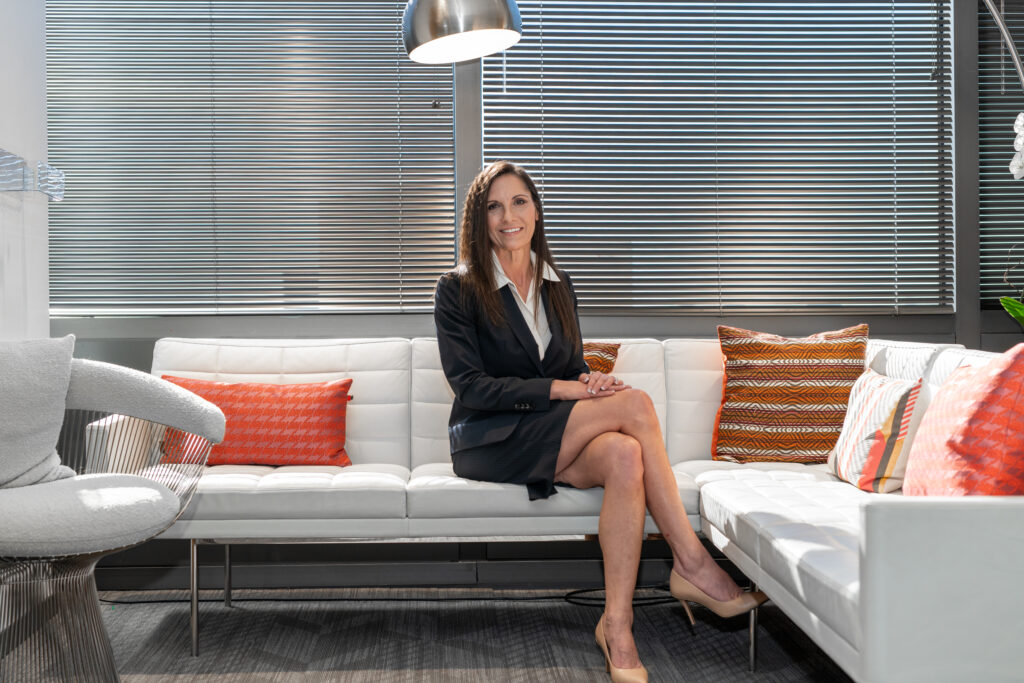
Teckman was born in Fort Worth and grew up in Bedford. Her father, who also was born in Fort Worth, owned an oil business. Her mother, who was born in Greece and moved to the U.S. when she was 18, worked for aerospace, electronics and airline conglomerates called LTV Vought.
In high school, Teckman ran track and was on competitive cheerleading squads, which she says “fed my inherent desire to compete.”
She had two uncles who were lawyers who influenced her toward becoming an attorney because she admired and respected them.
“I knew from a young age I wanted to be a lawyer,” she said. “As far back as I can remember, I wanted to be an attorney and people used to always tell me that I should be one. I think that might have meant I liked to argue a lot and win.”
Teckman earned a bachelor’s degree in business administration and accounting from the University of Texas at Austin and her law degree from Southern Methodist University in 1998.
After two years as an associate at Vial Hamilton in Dallas, she joined the litigation practice at Gardere in 2000 through 2002.
On Sept. 11, 2001, Teckman and others from Gardere were in New York City when the terrorists attacked.
“We were in a taxi in downtown when the first plane flew over us and into the World Trade Center,” she told The Texas Lawbook. “In shock, we jumped out of the taxi and tried to figure out what was happening. As we stood there stunned, the second one hit. It was coming from the angle directly opposite us, so all we saw was the huge explosion coming from the building towards us.”
“We ran in our business suits, heels and workbags back towards our hotel in Tribeca,” Teckman said. “I have never been so terrified in my life. Once back at the hotel, we were scrambling trying to figure out what to do. It was almost impossible to call anyone, and I recall looking out the window with horror as people jumped from the World Trade Center. Later, we were standing outside our hotel as the towers collapsed and we watched in shock as the ash came barreling down the streets towards us.”
Premium Subscriber Q&A: The Lawbook visited with the 2023 DFW Corporate Counsel Award honoree about criteria Teckman considers when hiring outside counsel and pet peeves.
“As people came towards us covered in soot, we offered them our showers,” she said. “I recall lying in bed at the end of the day and looking outside at what looked like a warzone and feeling immense sadness and loneliness. We were stuck in New York for quite a while afterwards. That experience hit on so many emotions and deeply impacted my life.”
Eight months later, Teckman actually moved to New York when she joined the Verizon legal department, where she managed outside counsel for more than 500 litigation matters in the Northeastern U.S.
“I have lived in Texas my entire life other than two years when I worked in Verizon’s legal department in NYC,” she said.
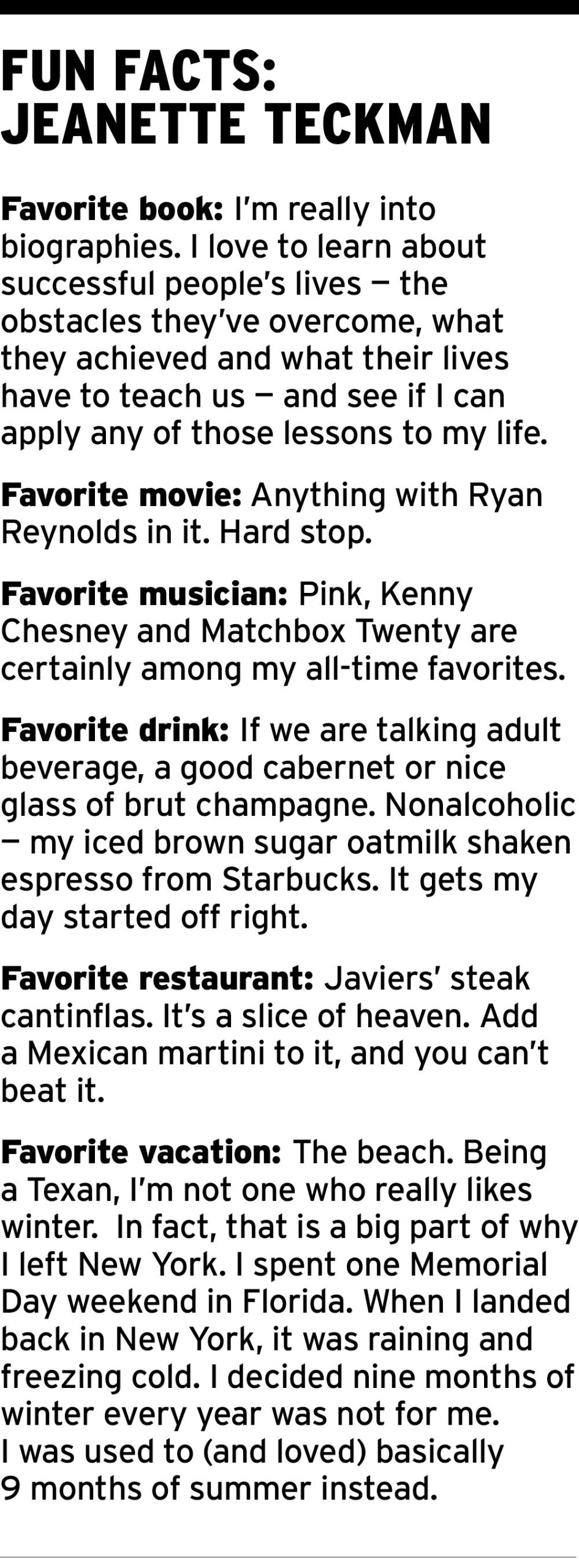
In November 2003, Teckman moved back to Dallas, where she became a partner focused on business litigation at Gardere — a position she held for nearly a decade.
TRT Holdings, the owners of Omni Hotels, Bob’s Steak and Chophouse and Gold’s Gym, hired Teckman as senior counsel of operations in July 2013.
Teckman said she went back in-house because she liked working for one client.
“When you are outside counsel, you generally have lots of cases, but for lots of different clients,” she said. “You don’t get to truly know the company inside and out, and don’t get to see how the outcome of each case really impacts and ripples through the company. When you are in-house, you do — outcomes are more meaningful. You really appreciate how important each case is and how it affects so many aspects of the business. I loved working for one company and becoming so passionate about it.”
In July 2017, a friend of Teckman who worked at Match Group reached out to her about the position of associate GC for litigation and intellectual property.
She applied and got the job.
“At bottom, Match is a technology company with a very compelling service — working for a thriving company in that space attracted me as well,” she said. “What’s not to love about working for a company that is all about finding people love?”
Douglas Dixon, a partner at Hueston Hennigan who was co-lead counsel for Match in the Google litigation, said he was constantly impressed with Teckman’s capabilities.
“Jeanette is a master at asking the right question — the ones that force teams to think creatively and uncover winning strategies,” Dixon said. “And perhaps most importantly, she never loses sight of the bigger picture, keeping Match’s long-term goals firmly in focus and driving every decision towards achieving them.”
Lawyers who work with Teckman say she truly values the advice of outside counsel.
“Jeanette values perspectives that are different than her own,” Zambrano said. “She wants to make sure she doesn’t have a blind spot based on her position in-house. That balance — being a relentless advocate for your company — but listening when outside counsel gives differing advice is a difficult one to strike but is one of the things that makes one an effective in-house leader.”
Stephen Myers Did Swipe Right
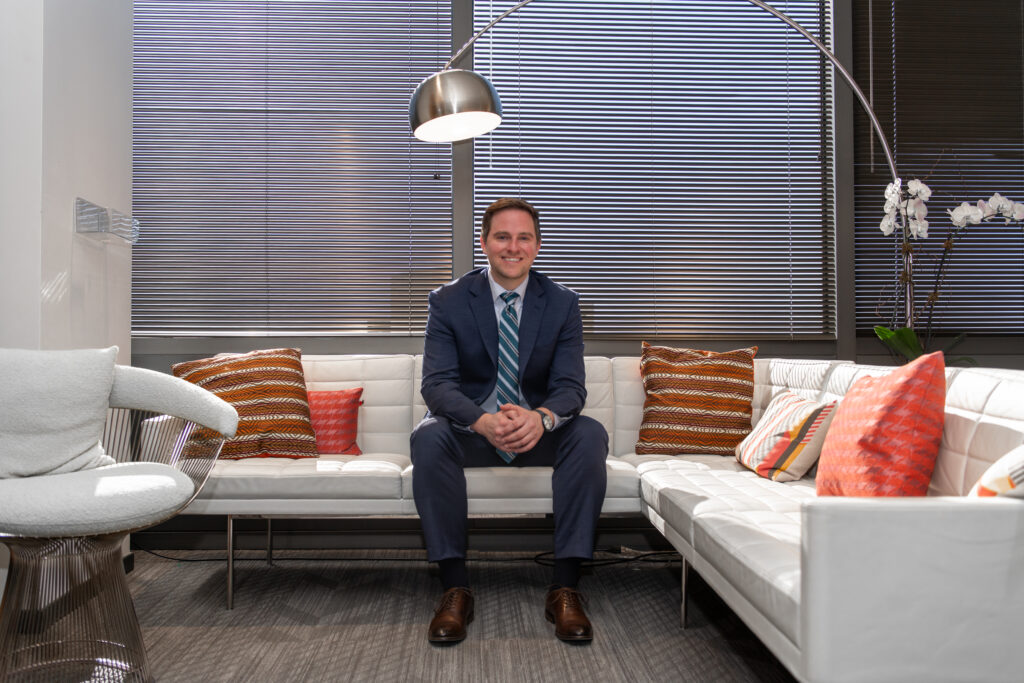
Myers was born on Galveston Island and grew up in Texas City. His mom was the deputy superintendent of Texas City ISD, where she worked for 41 years and retired in 2021. His dad spent 40 years in the energy sector, serving as the superintendent and emergency response manager for a major oil company before his retirement in 2021.
With no lawyers in the family, Myers points to his childhood fascination with TV lawyers Matlock, Perry Mason and Jake Brigance — as played by Matthew McConaughey in A Time to Kill — for sparking his interest in becoming a trial lawyer.
“As a kid, I orchestrated mock court sessions, subjecting my siblings and cousin to intense cross-examinations,” he said. “While it was all make-believe, I definitely took it too seriously. I think I made my poor cousin cry during an imaginary shoe theft trial.”
In middle school, Myers asked a family friend who was an attorney to “let me shadow him for a day.” The lawyer agreed and took him to a court appearance he had.
“It was my first time in a courtroom, and I knew after that day that I wanted to be a lawyer,” he said. “Other moments in my life confirmed that decision, such as when I interned at the White House during my junior year at UT Austin and realized that laws are at the center of everything we do as a society. If I wanted to help bring about societal change, I needed to be able to read, interpret and apply the law and advocate for my position.”
Premium Subscriber Q&A: The Lawbook spoke with the 2023 DFW Corporate Counsel Award honoree about factors Myers considers when hiring outside counsel and his best day at Match.

Myers earned his bachelor’s degree in government from the University of Texas in 2008 and his law degree from UT in 2011.
For five years, he practiced litigation at Norton Rose Fulbright before joining the legal department at Southwest Airlines in 2016.
“My experience at Fulbright was invaluable, providing me the chance to work with and learn from some of the most talented litigation attorneys in the nation, many of whom I still consider to be friends and mentors,” he said.
“I wanted to go in-house so I could become an expert in a particular industry and help a company with its litigation needs from beginning to end, as opposed to getting involved only after a lawsuit had been filed, which is what usually happens in private practice.”
Southwest Airlines, he said, “provided me everything I was looking for — great people, great company culture and values, and a complex and interesting litigation docket.
Myers said that he wasn’t looking to leave Southwest, but Match in 2020 made him an offer he “couldn’t pass up.”
“I’ve been able to take on more of a leadership role in my cases and handle a diverse array of litigation matters on a global scale,” he said. “Match has always had a special place in my heart because my partner, Spencer, and I met on the Tinder dating app in 2017. It’s very cool to represent a company that significantly changed my personal life for the better.”
Myers said he and a friend were at a Texas Rangers game in 2017 when his friend commandeered his cell phone and started looking through his Tinder profile for possible matches.
“My friend swiped right on Spencer and Spencer had swiped right on me,” he said. “We met and have been together ever since.”
Dixon said Myers did an extraordinary amount of hands-on work in the Google case. Myers’ main duties were running point on fact and expert discovery, reviewing all court filings, assisting with case strategy and preparing for trial.
“Stephen is relentless in his pursuit of the right answer and the right strategy,” he said. “He works extraordinarily hard and evaluates issues from every angle. He leaves no stone unturned.”
Katie Johnson ‘Couldn’t Pass Up this Perfect Match’
Johnson was born and grew up in Little Rock, Arkansas. Her mom is a paralegal and court reporter. Her dad owns a boat manufacturing company.
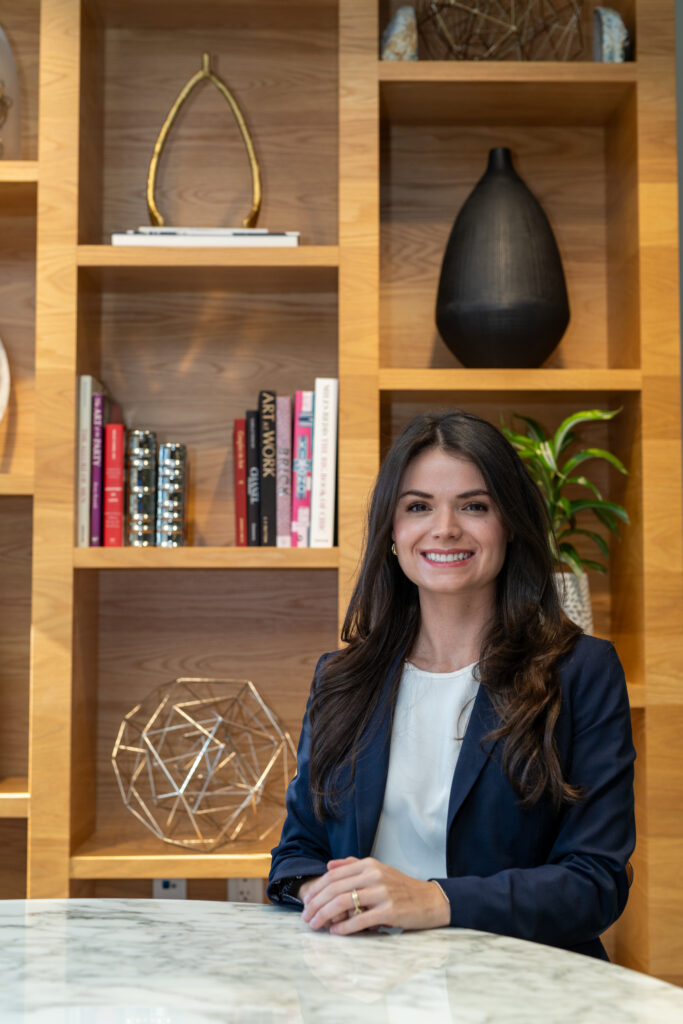
In addition to her mom being in the legal field, Johnson’s cousin and uncle were both lawyers — one a small-town lawyer and the other in Big Law.
“Each of them influenced me to go to law school for different reasons,” she said. “I first considered becoming a lawyer in first or second grade, when my cousin, Ashley Vinson Crawford, was touring law schools. Ashley decided on Harvard Law School, and as a young girl I innocently thought that was a path I should start on.”
Johnson earned her bachelor’s degree in political science from the University of Arkansas and then her law degree from SMU in 2018.
“I think my decision to leave Arkansas and attend SMU Dedman School of Law impacted my career the most,” she said. “I could have easily chosen to stay in Arkansas for law school and work for one of the firms in Little Rock, but choosing to move to Dallas catapulted my career into business litigation, which ultimately led me to Match Group.”
Johnson worked as a litigation associate at Akin Gump for nearly three years where she did a mix of business litigation and financial restructuring litigation.
“This experience, including prepping countless business clients for deposition and trial, presenting motions in court and taking a few depositions myself, put my career on a faster trajectory than most,” she said.
In June 2021, the corporate litigation position at Match was announced.
Premium Subscriber Q&A: The Lawbook chatted with the 2023 DFW Corporate Counsel Award honoree about Johnson’s best day at Match and what outside counsel should know about her.

“I was immediately drawn to the idea of that being my next move because of the robust legal department, fast-paced litigation, Dallas headquarters and it being an area of law that would be both fun and impactful,” she said. “I did not plan to leave the firm just yet, but I couldn’t pass up this perfect match — pun intended.”
One of Johnson’s first major projects at Match Group was revising the consumer-facing terms of use, with an eye towards updating the dispute resolution provisions.
“This project had a lot of moving parts, including implementing sometimes conflicting outside counsel advice, as well as working with our various brands to deploy the terms and proper acceptance pages,” she said. “It has been fulfilling to see language that I drafted on each of our global brands’ websites and apps.”
Greeson said that Johnson “excels in her analytical abilities and her adeptness in communicating complex legal issues in an accessible manner.”
Battle with Google
The relationship between Match and Google had been friendly and mutually profitable for a decade.
Google hosted Match’s dating apps on its Play Store for a fee, but Match Group’s portfolio apps used their own billing systems allowing users to choose between using Google or Match’s payment processes system for in-app purchases on Android.
In 2020, Google announced it was changing its policy to require all apps selling “digital goods and services” to exclusively use Google Play Billing for all in-app purchases. This requirement came with Google also taking up to 30 percent of every dollar a customer paid. After a few delays, the new policy went into effect on March 31, 2022. Google threatened to kick any apps that didn’t comply by that date out of the Google Play Store, which is the only viable app store on Android devices.
Thirty-seven state attorneys general, Epic Games and lawyers for consumer and app developers had already filed individual and class actions against Google for essentially the same allegations as Match, and all those cases had been consolidated into a multidistrict litigation in federal court in the Northern District of California.
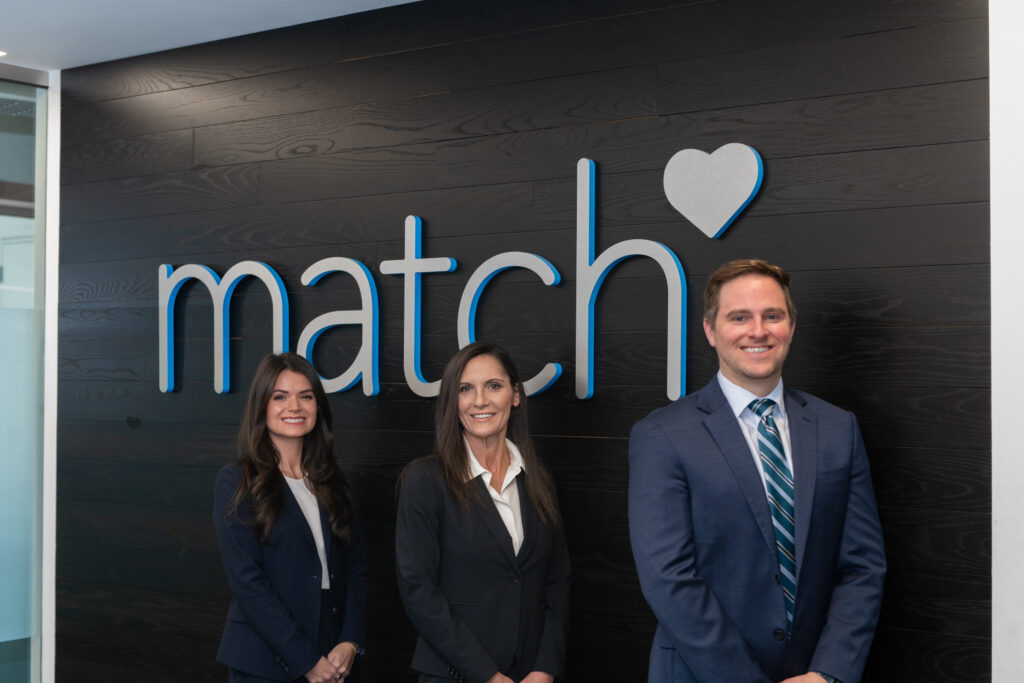
In interviews with Teckman, Myers and Johnson, the Match litigation team addressed a handful of critical concerns prior to filing any complaint, including:
- How to prevent Google from enforcing its policy and kicking Match’s apps off the Google Play Store while the lawsuit was pending;
- Whether filing suit was worth the risk of counterclaims by Google, potential harm to its general business relationship with Google and potential retaliation by Google — such as Google not approving its apps for distribution on the Play Store — given that Google controls the only viable method of reaching Android customers;
- Where the lawsuit would be brought, when to bring it and which Match Group portfolio entities would be on the lawsuit; and
- Whether it made sense from a strategic standpoint to join the ongoing MDL against Google, and how being co-plaintiffs could impact its case.
The Match lawyers agreed that its lawsuit would list five plaintiffs — the parent company, Match Group, and portfolio companies that operate Tinder, OkCupid, PlentyofFish and OurTime).
The Match team also sought and obtained immediate injunctive relief against Google and successfully obtained a stipulation and order that maintained the status quo of their business relationship pending the lawsuit, which prevented Google from kicking Match apps off Google Play.
Teckman and Myers hired Hueston Hennigan, a highly respected and successful 85-attorney litigation firm based in California as its lead outside counsel.
“We were confident that their team, which was led by Doug Dixon and Joseph Reiter, had the requisite expertise, skills and bandwidth to handle the case,” Myers said. “They are also located in California and have experience presenting before juries in the Northern District of California.”
The decision to file the lawsuit in California ended up being a simple one.
The lawsuit brought by the 37 state AGs, Epic Games and the two class actions was already well underway in the Northern District of California for similar claims before Match filed its lawsuit in May 2022. And Google’s developer distribution agreement has a venue provision requiring that all claims be brought in the county of Santa Clara.
Teckman admits the team faced several challenges in bringing this case.
“One of the most critical was figuring out how to effectively prosecute our claims in the context of an ongoing MDL with various other co-plaintiffs that had similar — but not always the same — priorities and theories of liability,” she said. “This required a lot of creative thinking and close coordination with the other plaintiffs with respect to how we crafted trial themes, approached fact and expert discovery and advanced certain arguments in dispositive motions.”
“Given that a similar antitrust case had been brought against Apple and failed, we also had to figure out how to position our case to overcome the evidentiary gaps from the Apple case, which we ultimately did,” Teckman said.
The Match legal team also faced an expedited trial schedule. Match filed its complaint in May 2022, and the MDL trial judge set jury selection for early April 2023. Fact and expert discovery cutoff dates were in early August and November 2022, respectively.
“While these deadlines were ultimately adjusted —but not by much — we were under extreme time constraints to complete discovery spanning millions of documents, numerous expert reports and dozens of depositions, all while complying with all other deadlines for dispositive motions, pre-trial and so forth,” said Myers, who managed the day-to-day operations of the litigation. “The above challenges were compounded by the fact that four of our operating companies, which independently operate their respective brands, were plaintiffs in the case — meaning we were essentially doing discovery for four separate entities rather than one.”
A few months before trial was scheduled to start, the Match team hired Tillotson of Tillotson Johnson & Patton to add some power to its trial team. Sine and Teckman had met Tillotson when he was honored by ACC-DFW and The Lawbook for the DFW Business Litigation of the Year for representing AT&T in a complex antitrust case.
“Jeff Tillotson is an aggressive and strategic trial lawyer who has vast experience litigating complex matters such as our case against Google,” Myers said. “Jeff was instrumental in helping us identify key issues for trial and framing them in a way that would effectively resonate with a jury. And it was cool that we started our relationship with Jeff because of ACC and The Texas Lawbook.”
The Match team learned during discovery that Google “failed to properly preserve thousands of Google Chats,” which are communications between Google employees through Google’s in-house instant-messaging tool.
“These deleted chats deprived plaintiffs of critical evidence, leading them to file a Rule 37 motion for sanctions against Google,” Teckman said. “After months of briefing the issue and several hearings, the court found that Google intentionally failed to preserve evidence and granted the motion, ordering Google to pay costs and fees for filing the motion. Given the egregiousness of Google’s conduct, the court also issued a permissive adverse inference jury instruction, which allowed jurors to infer that the deleted chats contained evidence that was unfavorable to Google.”
The spoliation ruling was a critical victory because it would permit the jury to hear about and consider it in their deliberations. The judge’s ruling could also have provided Match additional leverage during settlement discussions.
“We were able to develop a compelling case during discovery, with different strengths than the other plaintiffs, given our unique past relationship with Google and how Google for years allowed us to use alternative in-app payment systems, our reliance on the Google Play Store to reach Android users and our inability to effectively offer our services through other distribution channels,” Johnson said. “Our expert put together a strong report supporting hundreds of millions of dollars in damages. And we developed strong evidence that Google had unlawfully monopolized the Android app distribution market and prevented competition through illegal and anti-competitive agreements with phone manufacturers, app stores, app developers and carriers.”
The litigation took another twist two months before trial was set to start when the 37 state attorneys general announced they had settled their disputes with Google for $700 million and some significant non-monetary concessions.
At the same time, the judge ordered Match and Google and its top executives to attend a mediation in an attempt to settle.
“That first mediation effort was unsuccessful and I doubted that talks would really get us far, but we kept talking,” Teckman said.
On Oct. 31, Halloween day, Match and Google announced they had reached an agreement.
Match essentially pocketed about $300 million in savings, which included $40 million that Match deposited into an escrow account for fees not paid during the dispute. The non-monetary terms of the settlement were even more critical to Match, and the two technology giants have a closer working relationship than ever before.
“Rarely have I seen a business case pose this many challenges to the in-houseteam,” Tillotson wrote in nominating the Match litigation team for the award. “Jeannette, Stephen and Katie handled it brilliantly. They expertly managed outside counsel, multiple clients, sometimes difficult co-plaintiffs, a demanding judge and a relentless opponent with unlimited resources, all to obtain a result that thrilled Match’s executives.”
“This in-house team was involved in the nuts and bolts of the case in a way you rarely see,” Tillotson said. “They met with witnesses, attended hearings, reviewed documents, edited pleadings, worked on the overall case strategy and helped get the case ready for trial. In their spare time the made sure the corporate public messaging remained consistent with the trial strategy and Match’s business objectives. This team truly helped achieve the success their executives wanted and customers needed.”
